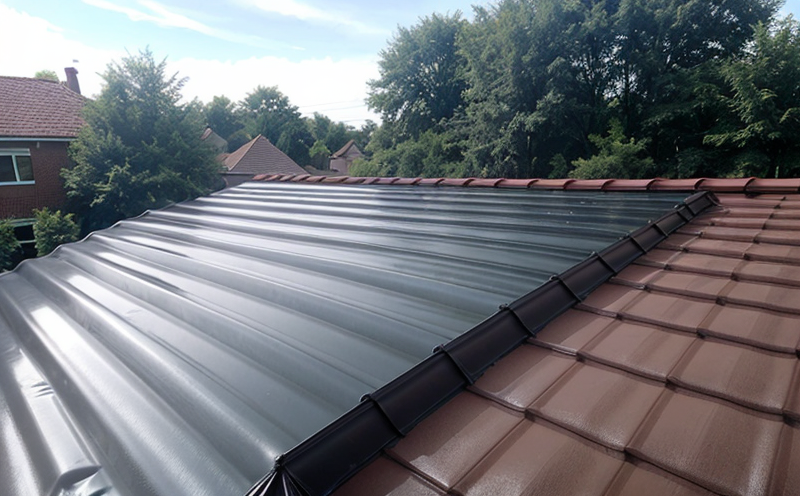ASTM D1970 Performance Evaluation of Modified Bitumen Sheets
The ASTM D1970 standard is pivotal in evaluating the performance of modified bitumen sheets used in roofing and waterproofing applications. This testing method focuses on determining the resistance to low-temperature cracking, a critical property for ensuring that the material performs effectively under cold weather conditions.
Modified bitumen sheets are widely utilized due to their flexibility, durability, and cost-effectiveness. These materials are designed to withstand various environmental stresses and are commonly used in residential, commercial, and industrial roofing systems. ASTM D1970 provides a standardized approach for assessing how well these sheets can maintain their integrity at low temperatures without cracking.
The testing process involves subjecting the modified bitumen sheet samples to specified temperature conditions before conducting visual inspections. The primary objective is to identify any signs of cracks or other forms of degradation that could compromise the effectiveness of the roofing or waterproofing system. This evaluation ensures compliance with industry standards and helps manufacturers produce high-quality products.
The methodology prescribed by ASTM D1970 includes detailed instructions on sample preparation, equipment calibration, and temperature control. It emphasizes accuracy in maintaining precise conditions to ensure reliable test results. Understanding these nuances is essential for achieving consistent outcomes across different laboratories and facilities.
Implementing ASTM D1970 also aids in quality assurance by providing a clear framework for testing. This standardization fosters trust among stakeholders, including clients, regulatory bodies, and suppliers. By adhering to this methodology, organizations can demonstrate their commitment to delivering superior products that meet or exceed expectations.
In summary, ASTM D1970 plays a crucial role in the roofing and waterproofing industry by offering a robust framework for evaluating modified bitumen sheets' performance under low-temperature conditions. Its implementation ensures consistent quality control and promotes innovation through continuous improvement processes.
Industry Applications
| Application Area | Description |
|---|---|
| Residential Roofing | Ensures that roofs in colder climates remain effective and crack-free even during winter months. |
| Commercial Buildings | Aids in the design of durable, long-lasting roofing solutions for large-scale structures. |
| Industrial Facilities | Supports the creation of robust waterproofing systems suitable for harsh industrial environments. |
| Infrastructure Projects | Facilitates the development of reliable roofing and waterproofing materials for public works projects. |
| Retrofitting Existing Structures | Helps in assessing whether existing roofs can be effectively repaired or replaced with modified bitumen sheets. |
| New Construction Projects | Aids in selecting appropriate roofing and waterproofing materials that meet project specifications. |
| R&D & Innovation | Enables continuous improvement of products through rigorous testing according to industry standards. |
| Quality Assurance | Promotes consistent product quality by providing a standardized method for evaluating modified bitumen sheets. |
Why Choose This Test
The ASTM D1970 performance evaluation is an indispensable tool for ensuring the reliability and longevity of roofing and waterproofing systems. By focusing on low-temperature cracking resistance, this test helps manufacturers produce high-quality products that can withstand extreme weather conditions.
This standardization not only enhances product quality but also contributes to environmental sustainability by promoting durable materials that require less frequent replacements. Additionally, it supports regulatory compliance and fosters trust among all parties involved in the roofing and waterproofing industry.
For quality managers and compliance officers, ASTM D1970 offers a clear pathway for meeting regulatory requirements while ensuring product excellence. R&D engineers benefit from this standardized approach as they can rely on consistent test results to refine their designs continuously. Procurement professionals appreciate its role in sourcing reliable suppliers who adhere to industry best practices.
The test's ability to provide accurate and reproducible results makes it a preferred choice for various stakeholders within the roofing and waterproofing sector. Its widespread adoption underscores its importance in maintaining high standards across all applications, from residential homes to large-scale industrial facilities.
Competitive Advantage and Market Impact
Adopting ASTM D1970 for performance evaluation of modified bitumen sheets can significantly enhance a company's competitive position within the roofing and waterproofing market. By ensuring that products meet or exceed industry standards, businesses can differentiate themselves by offering superior quality and reliability.
Compliance with this standard demonstrates a commitment to excellence, which builds customer confidence and loyalty. This trust translates into repeat business opportunities and positive word-of-mouth recommendations. Moreover, adherence to such rigorous testing protocols can open doors to new markets where stringent regulatory requirements are in place.
The test also plays a crucial role in fostering innovation within the sector by encouraging continuous improvement based on validated data. By staying ahead of competitors through advanced product development and improved manufacturing processes, companies positioned as leaders in this field gain significant advantages.
Furthermore, compliance with ASTM D1970 can contribute to broader market trends towards sustainability and energy efficiency. As society places greater emphasis on eco-friendly solutions, having a track record of meeting high-quality standards becomes increasingly valuable. Companies that prioritize such practices are well-positioned to capture growing segments of the market driven by environmental consciousness.
In conclusion, embracing ASTM D1970 for performance evaluation offers numerous benefits that extend beyond mere compliance. It drives innovation, enhances reputation, and supports sustainable growth—all key factors contributing to sustained success in today's competitive marketplace.





